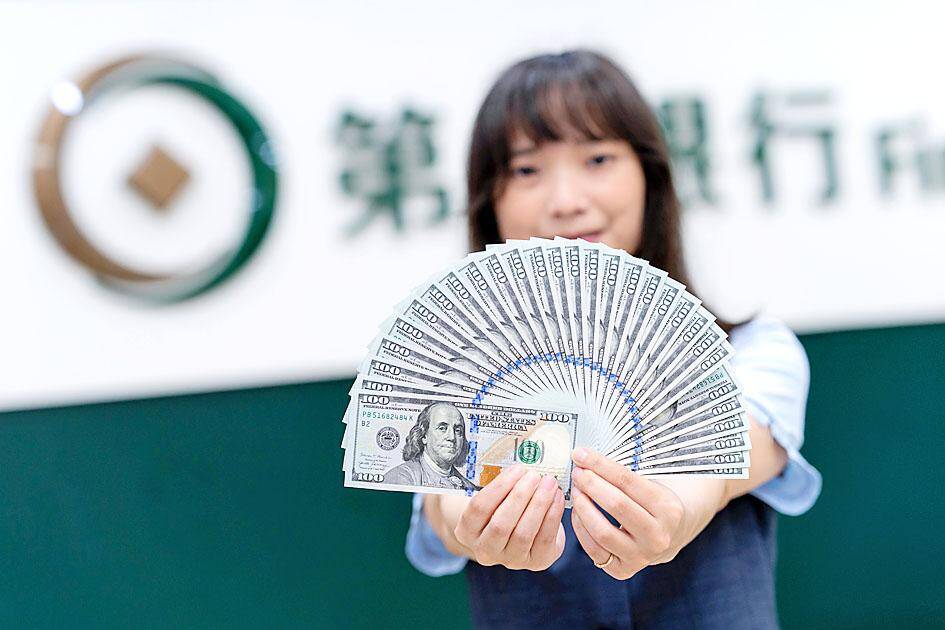Interest rates on new loans at the nation’s five major state-run banks rose 9 basis points to an average of 1.541 percent last month, after local lenders raised borrowing costs on almost all types of loans to reflect the central bank’s interest rate hikes, the central bank said yesterday.
The central bank on Sept. 22 increased its policy rate by 0.125 percentage points to tame inflation, prompting the Bank of Taiwan (臺灣銀行), Land Bank of Taiwan (土地銀行), Taiwan Cooperative Bank (合作金庫銀行), Hua Nan Commercial Bank (華南銀行) and First Commercial Bank (第一銀行) to increase interest rates on mortgages, consumer loans and capital expenditure loans.
Private lenders generally took cues from their state-run peers and set interest rates with extra risk premiums.

Photo: Chen Mei-ying, Taipei Times
Interest rates on new mortgages climbed to 1.827 percent, the highest in six-and-a-half years, and new mortgages fell to NT$47.27 billion (US$1.51 billion), the lowest since February, the central bank told a news conference in Taipei.
The decline in mortgages indicated that prospective buyers had turned cautious amid economic uncertainty, the central bank said, adding that the negative wealth effect due to stock price corrections helped dampen buying interest.
The decline correlated with a monthly fall of 6.87 percent in property transactions last month, even though September is traditionally a peak month for such deals, the central bank said.
Sinyi Realty Inc (信義房屋), Taiwan’s only listed broker, said that the cooling market would give the central bank a reason to refrain from introducing unfavorable measures at its next board meeting next month.
However, several central bank directors last quarter expressed concerns over house price hikes and pushed for stronger monetary tightening, the minutes of the bank’s previous meeting showed.
Interest rates on capital expenditure loans were 1.997 percent on average, shedding 2.6 basis points from one month earlier, but new loans rose by NT$8.13 billion to NT$75.28 billion, driven mainly by companies in the transportation sector, the central bank said.
Interest rates on working capital loans picked up 8.9 basis points to 1.479 percent, but overall loans fell by NT$121.35 billion to NT$873.91 billion, the central bank said, adding that companies usually have less demand for working capital at the beginning of a quarter.
Interest rates on consumer loans increased 8.3 basis points to 2.792 percent, with lending rising by NT$233 million to NT$5.22 billion, the central bank said.

MARKET LEADERSHIP: Investors are flocking to Nvidia, drawn by the company’s long-term fundamntals, dominant position in the AI sector, and pricing and margin power Two years after Nvidia Corp made history by becoming the first chipmaker to achieve a US$1 trillion market capitalization, an even more remarkable milestone is within its grasp: becoming the first company to reach US$4 trillion. After the emergence of China’s DeepSeek (深度求索) sent the stock plunging earlier this year and stoked concerns that outlays on artificial intelligence (AI) infrastructure were set to slow, Nvidia shares have rallied back to a record. The company’s biggest customers remain full steam ahead on spending, much of which is flowing to its computing systems. Microsoft Corp, Meta Platforms Inc, Amazon.com Inc and Alphabet Inc are

Luxury fashion powerhouse Prada SpA has acknowledged the ancient Indian roots of its new sandal design after the debut of the open-toe footwear sparked a furor among Indian artisans and politicians thousands of miles from the catwalk in Italy. Images from Prada’s fashion show in Milan last weekend showed models wearing leather sandals with a braided design that resembled handmade Kolhapuri slippers with designs dating back to the 12th century. A wave of criticism in the media and from lawmakers followed over the Italian brand’s lack of public acknowledgement of the Indian sandal design, which is named after a city in the

INVESTOR RESILIENCE? An analyst said that despite near-term pressures, foreign investors tend to view NT dollar strength as a positive signal for valuation multiples Morgan Stanley has flagged a potential 10 percent revenue decline for Taiwan’s tech hardware sector this year, as a sharp appreciation of the New Taiwan dollar begins to dent the earnings power of major exporters. In what appears to be the first such warning from a major foreign brokerage, the US investment bank said the currency’s strength — fueled by foreign capital inflows and expectations of US interest rate cuts — is compressing profit margins for manufacturers with heavy exposure to US dollar-denominated revenues. The local currency has surged about 10 percent against the greenback over the past quarter and yesterday breached

The US overtaking China as Taiwan’s top export destination could boost industrial development and wage growth, given the US is a high-income economy, an economist said yesterday. However, Taiwan still needs to diversify its export markets due to the unpredictability of US President Donald Trump’s administration, said Chiou Jiunn-rong (邱俊榮), an economics professor at National Central University. Taiwan’s exports soared to a record US$51.74 billion last month, driven by strong demand for artificial intelligence (AI) products and continued orders, with information and communication technology (ICT) and audio/video products leading all sectors. The US reclaimed its position as Taiwan’s top export market, accounting for